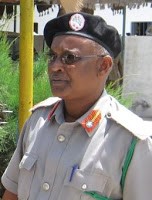Andrew McGregor
January 14, 2010
Somalia’s al-Shabaab movement attempted to kill General Muhammad Gele Kahiye, the new leader of the government’s military forces, on January 7 in a pre-emptive strike. The assassination attempt comes before a much-anticipated government offensive to retake Mogadishu from the Islamist militants who now control most of the city. Kahiye escaped the blast in Mogadishu’s Hodon district, but two bodyguards were killed and six others wounded (Horseed Media, January 7). Somali police spokesman Abdullahi Hassan Barise later denied Kahiye was in the car when it was hit by the mine (Radio Simba, January 7).
Colonel Kahiye replaced General Yusuf Hussein Dhumal as commander of the Somali Armed Forces on December 6 after several weeks of debate at the highest levels of the Transitional Federal Government (TFG) of President Shaykh Sharif Shaykh Ahmad (Raxanreeb, December 6, 2006; Reuters, December 6, 2009). The move finally came three days after a suicide bomber killed three government ministers and many others at a Mogadishu graduation ceremony. National security minister Abdullahi Muhammad Ali remarked at the time, “This is a part of a national plan to activate the army and the security institutions ahead of intended government military operations to restore law and order” (AP, December 6, 2009).
Al-Shabaab spokesman Shaykh Ali Dheere claimed responsibility for the attack, saying the group’s intention was to kill the military’s commander. “We wanted to kill the military chief to counter government planned offensives on our positions in Mogadishu and its environs” (Radio Gaalkacyo, January 7; Garowe Online, January 7). On the same day, a spokesman for al-Shabaab’s Islamist rivals, Hizb al-Islam, denounced the government at a Mogadishu press conference for what he described as an impending government military offensive designed to retake Mogadishu, which several TFG ministers have promised to do by the end of the month (Shabelle Media Network, January 7). The spokesman, Shaykh Muhammad Moallim Ali, suggested that the government forces planned to begin with assaults on Mogadishu’s Bakara arms market and the Elasha Biyaha settlement south of Mogadishu (Mareeg, January 7).
Several hours after the failed assassination, al-Shabaab militants launched a mortar attack on the presidential palace in Mogadishu. Government forces retaliated with artillery fire directed at Mogadishu’s Yaqshid neighborhood, a reputed al-Shabaab stronghold (AFP, January 7). Some 20 civilians were killed in the shelling, which was reported to have hit a number of houses and some children playing soccer (Mareeg, January 7; AFP, January 7).
This article first appeared in the January 14, 2010 issue of the Jamestown Foundation’s Terrorism Monitor

